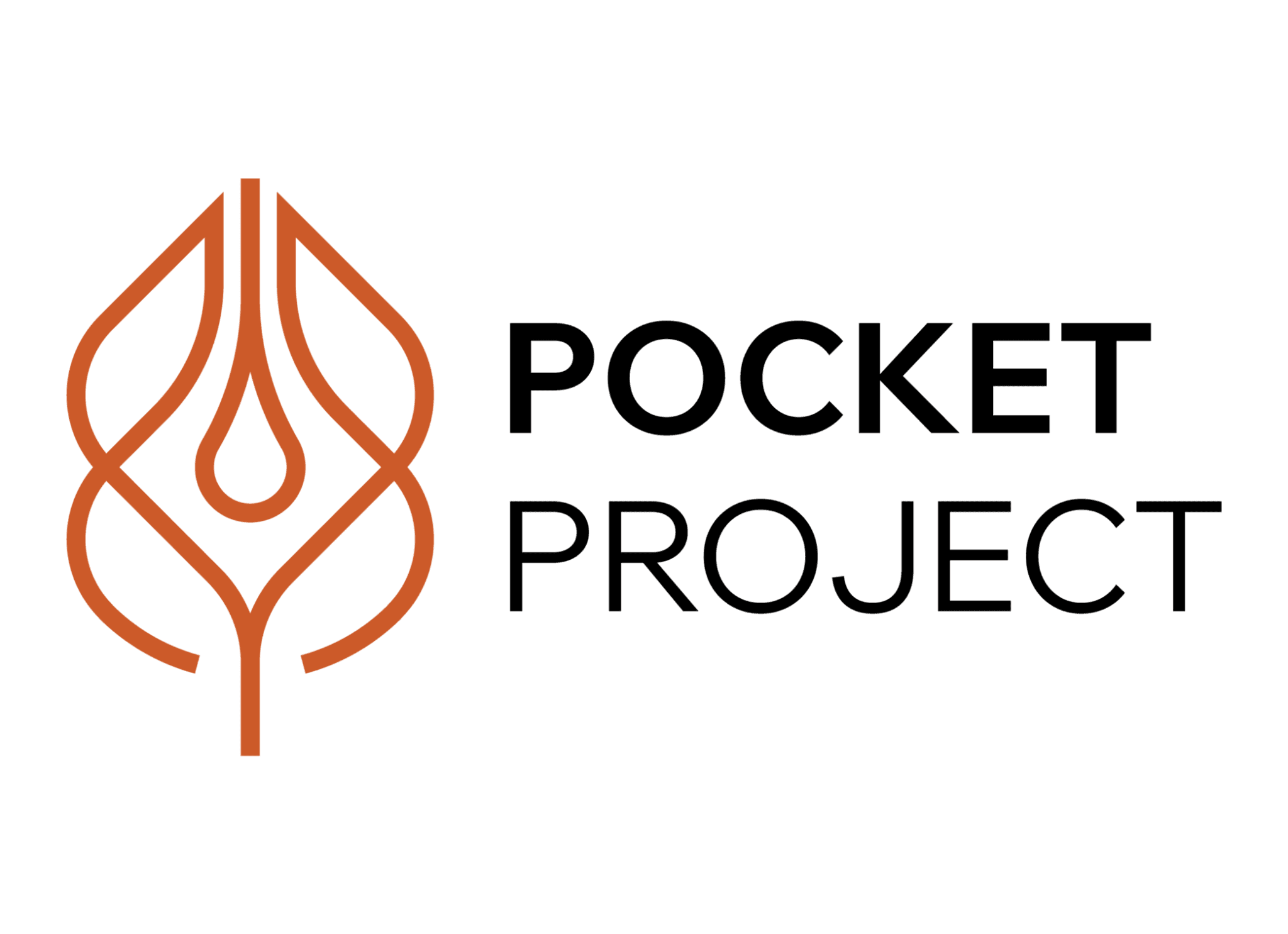Collective Trauma Research
A Transdisciplinary Exploration of Trauma & Healing
Trauma Studies & Research Introduction
Collective trauma research is inherently complex and demands a multidisciplinary approach. Insights from biology, neuroscience, psychology, cultural studies, anthropology, law, political science, indigenous knowledge, and sociology each contribute unique perspectives, yet alone offer only partial understanding. The Pocket Project seeks to bridge these fields within an integrated framework, deepening knowledge and developing effective strategies for awareness and integration. Through ongoing research, we aim to generate complexity-based data to inform policy and practice, fostering a more adequate response to collective trauma.
Pocket Project Research Network
The Pocket Project invites students at the Bachelor’s, Master’s, and Doctoral levels to join a growing international network of researchers working at the intersection of collective trauma, systems change, and applied complexity science.

Pocket Project Evaluation & Research
We create rapid feedback loops and research programs to generate the data that drives an evidence-based approach
We implement regular feedback loops to gather input from stakeholders, participants, and beneficiaries, enabling real-time improvements. Our evaluation framework supports rapid feedback loops, assessing all activities to identify successes and areas for growth. By leveraging data-driven insights, we inform decision-making, resource allocation, and strategic planning for continuous learning. Through collaboration with research institutions like the Cynefin Company and the University of Witten Herdecke, we deepen our understanding of Collective Trauma Integration.
Epigenetic Study
Published: 2025
In our epigenetic study with the Helmholtz-Zentrum in München and the University Luxembourg we are investigating the effects of the Timeless Wisdom Training on epigenetic changes of participants. We aim to measure therapeutic interventions’ molecular impact, using advanced DNA methylation analysis to explore potential gene activity changes related to stress, trauma, and resilience. While the data analysis is still ongoing, first results are already out.
Sacred Story Book
Published: 2025
In a qualitative pilot project using SenseMaker, personal narratives from participants in the International Labs were collected to explore experiences of ancestral and collective trauma integration. Through micro-stories shared across diverse cultural and generational backgrounds, the Sacred Story Book offers insight into how individuals describe processes of grief, resilience, and reconnection within the Labs’ year-long process. The narratives reveal shifts in meaning-making and relational presence that emerge when trauma is met with collective holding and attentive witnessing. Together, these stories provide a nuanced qualitative understanding of transformation in trauma-informed, community-based settings, inviting readers to engage in shared pathways of healing.
Collective Trauma & Democracy
Published: 2022
In an innovative pilot project using SenseMaker, over 600 micro-narratives were analyzed to understand collective trauma integration in the context of democracy, crisis, and polarization. Collaborating with More Democracy, Research Institute for Sustainability Potsdam, Complexity Partners, Institute for Integral Studies as well as Cynefin Company were able to publish a comprehensive research report. Overall we found substantial shifts towards positive perceptions of democracy, enhanced self-efficacy, and improved dialogue skills, highlighting the importance of trauma-informed, co-creative communication in crises after a collective trauma integration process with 350 German citizens.
Published: 2021 & 2025
The International Labs with over 30 global groups, explore intergenerational and collective trauma. We are using SenseMaker software to collect participant stories. This research builds on the previous labs from 2020/21, where over 70 narratives show first signs of positive impacts despite the challenges of engaging with collective trauma. Key areas of research included the possible increase of systemic awareness, compassion, and empowerment. To see the research report and further evaluations of the International Labs go here.
Published: 2024
The Global Social Witnessing Toolkit addresses the challenge of responding to the world’s suffering in a meaningful way. The toolkit was developed by diverse partners such as Prof. Matoba Kazuma from University Witten/Herdecke and funded by the EU. This research underscores the importance of staying emotionally connected and compassionate, even when faced with distressing news. The findings demonstrate how Global Social Witnessing fosters a deeper sense of connection and responsibility, enabling individuals to engage with the world more authentically and constructively.
Published: 2024
The Trauma-Informed Leadership Research Report provides valuable insights into the effectiveness of integrating trauma-informed principles in leadership roles. By systematically evaluating participant experiences and outcomes, the report highlights the positive impacts. The research underscores the importance of trauma awareness in leadership, showcasing how it enhances trust, safety, and empowerment within teams and communities. The findings contribute to our understanding of effective leadership strategies that support collective trauma integration to drive positive change.
Published: 2021 & ongoing
We value research and ongoing evaluation for Pocket Project activities because they provide essential insights on how to address collective trauma. Systematic evaluations measure the impact of our programs, identify areas for improvement, and ensure our methods stay relevant and effective. Continuous research and evaluation drive our commitment to excellence and innovation, enabling us to contribute meaningfully to the field of trauma healing. Here you find previous evaluations of several programs.
In an effort to step out of the familiar echo chambers of research, we combine a trans-contextual perspective informed by applied complexity to grow our shared understanding of collective trauma.
Thematic Areas of Collective Trauma Research
Collective Trauma Studies
In collective trauma studies, we grapple with the intricate web of suffering that extends into the communal bonds of society. Embedded within collective trauma is the paradox of representation: trauma mutes and silences, isolating individuals, families, and cultures, yet it also brings people together to find new meaning and language for the unspeakable. Traditional modes of representation falter when capturing the myriad voices and narratives converging in mass traumatization.
Structures and systems meant to provide solace may often perpetuate harm, revealing dominant norms that fail to address the root causes of trauma. This contributes to global polycrises, extracting from marginalized communities and eroding our shared future.
Applied complexity and assemblage theory, emphasizing the interplay of heterogeneous elements forming complex wholes, offer a potent lens for exploring this terrain. Collective trauma research illuminates our interconnectedness: everything is in conversation and relationship, even if we can’t feel it. Scientists become tender narrators, enabling navigation of the complexities of collective trauma, fostering shared understanding, and flourishing futures.
Urgent questions emerge: What constitutes healing on a collective scale? Who is responsible for nurturing our collective well-being? These questions demand a paradigm shift, challenging us to reimagine humanity in a traumatized world.
Towards a comprehensive understanding
Numerous disciplines and research efforts contribute diverse perspectives within the scientific field of collective trauma studies. To overcome disciplinary echo chambers and achieve a comprehensive understanding, the following framework positions different perspectives within the broader landscape of collective trauma research.
In the Pocket Project we draw on 12 thematic areas within collective trauma research all of those are related to different scientific disciplines. To give an orientation about the main focus of these thematic areas, their key terminology can be broadly positioned between Time, Body, Power and Meaning.
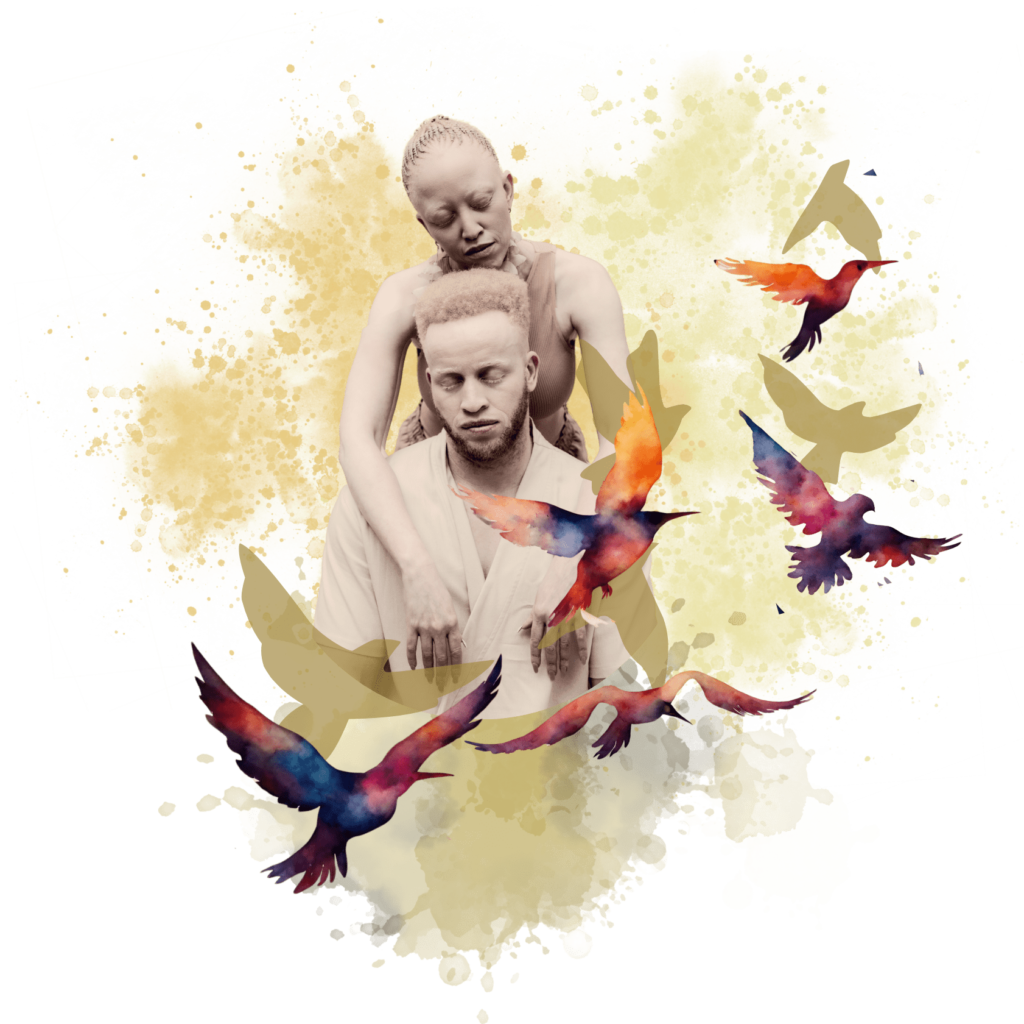
Meaning
Collective Dimension
Sociology-cultural
Time
Process Dimension
History-temporal
Power
Structural Dimension
Legal-political
Body
Individual Dimension
Psychology-biological
Thematic Areas Resource Library
Please visit our Resource Library, where you can select “Academic Research” in the Category Filter, and then select any of the sections below to find scientific articles related to each of the following areas:
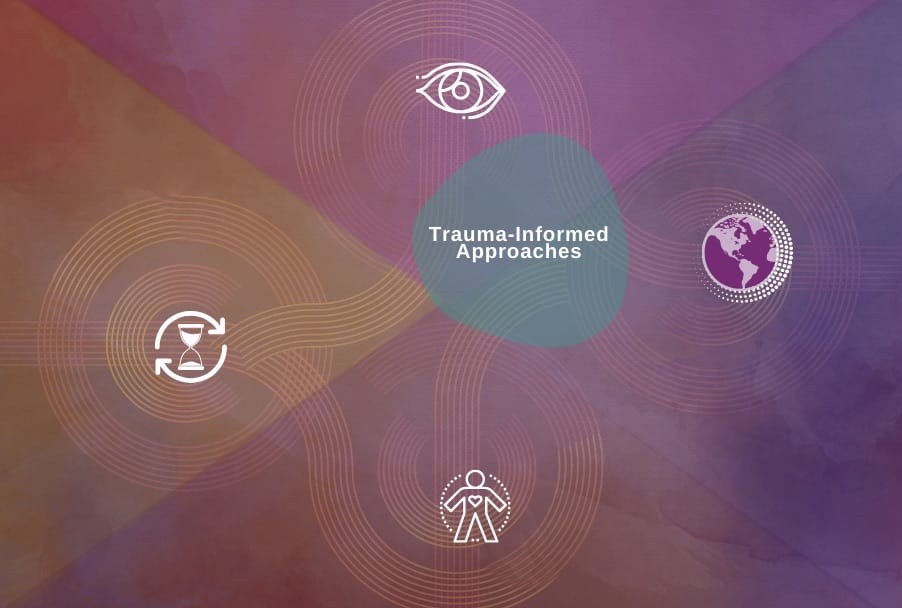
Trauma-Informed
An Awareness of Trauma Dynamics
Trauma-informed approaches encompass a comprehensive understanding of trauma’s effects on individuals and communities. A core element is to recognize trauma and the related systems as well as to mainstream practices of resourcing to cope with trauma. Integrating insights from psychology, psychiatry, and social theory, these approaches emphasize sensitivity to trauma’s pervasive impact. They employ holistic frameworks to guide therapeutic interventions and research methodologies to promote healing and resilience. By fostering interdisciplinary dialogue and practical applications, trauma-informed approaches seek to enhance understanding of trauma’s complex interplay with cultural, social, and ethical dimensions in various contexts, from personal recovery to community well-being. These approaches prioritize creating safe environments that validate survivors’ experiences and empower them through compassionate and informed care practices. Implementing trauma-informed principles helps to mitigate re-traumatization and supports long-term recovery and well-being.
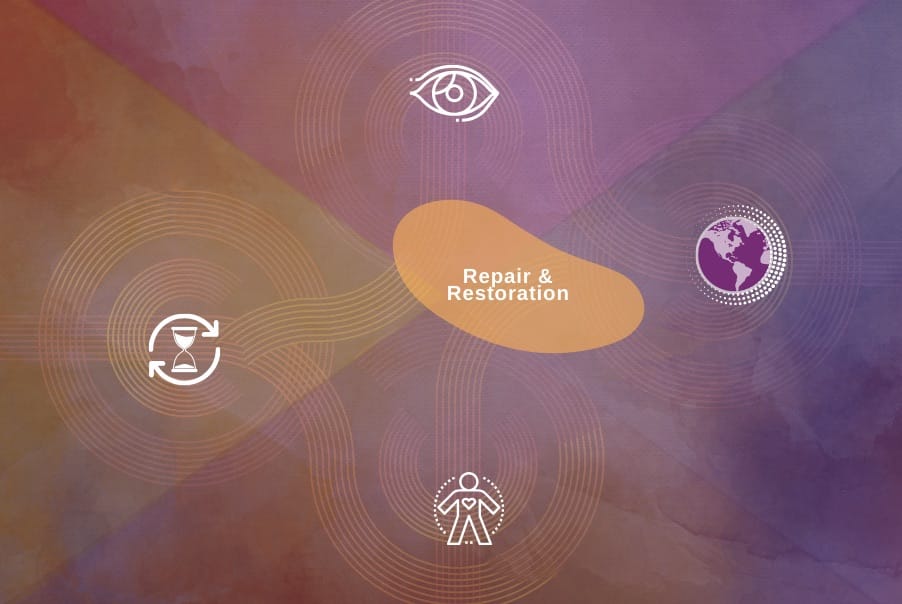
Repair & Restoration
The Potential to Grow More Resilient
Repair and restoration in the context of collective trauma encompasses multifaceted approaches aimed at addressing and healing the deep wounds inflicted on communities by shared traumatic experiences. This process acknowledges the interconnectedness of individual and collective suffering, drawing on insights from psychology, sociology, anthropology, and other disciplines to navigate the complexities of trauma’s aftermath. It involves creating supportive environments that facilitate healing, rebuilding trust, and fostering resilience among affected groups. By integrating diverse perspectives and methodologies, efforts in repair and restoration aim not only to heal immediate wounds but also to empower communities to rebuild a sense of identity, cohesion and hope for the future in the wake of profound adversity.
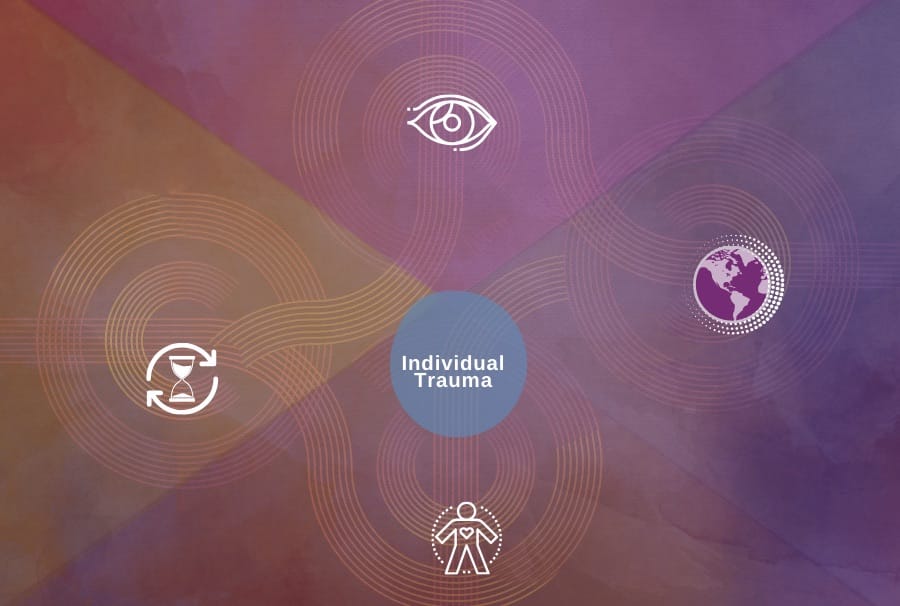
Individual Trauma
Trauma as Embodied Memory
“All trauma is preverbal” encapsulates the essence of Bessel van der Kolk’s work on implicit and traumatic memory. Van der Kolk’s research emphasizes how traumatic experiences, particularly in early childhood, are encoded in sensory and emotional networks of the brain before language development occurs. This concept highlights the limitations of verbal expression in capturing the full breadth of traumatic experiences. Instead, traumatic memories often manifest implicitly through bodily sensations, emotions, and behavioral responses. Van der Kolk’s framework underscores the importance of non-verbal modalities in trauma processing and informs trauma-informed interventions that prioritize somatic experiencing and other non-verbal approaches to healing.
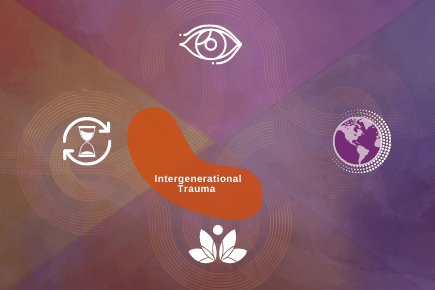
Intergenerational Trauma
Inherited Trauma Dynamics
Inter- & Transgenerational Trauma has been researched since 1966. The first study was published by Canadian psychiatrist Vivian M. Rakoff, examining high rates of psychological distress among children of Holocaust survivors. Inter- and Transgenerational trauma encompasses both conscious and unconscious inheritance of traumatic experiences. Researchers like Vera Békés & Claire J. Starrs identify these traumas across generations, highlighting how historical traumas persist in familial and cultural narratives. They illustrate the enduring impact of past injustices on present-day individuals and communities and how it shapes psychological well-being.
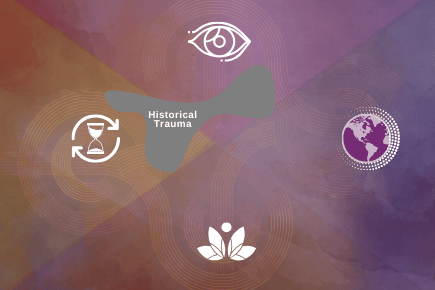
Historical Trauma
Multigenerational Trauma of a Group
Braveheart’s research on historical trauma explores how past injustices like colonization, slavery, and genocide shape collective identity and perpetuate suffering across generations. She emphasizes nuanced interventions that consider historical context and cultural specificity, aiming to disrupt cycles of injustice and promote an inclusive societal narrative. “Chosen Trauma,” a concept within historical trauma by Vamik Volkan, examines how specific past traumas forge collective identity and cohesion. These traumas influence intergenerational dynamics, revealing insights into how historical grief and humiliation persist and can be politicized by leaders. Volkan’s work underscores the enduring impact of collective historical experiences on societal psyches and intergroup relations.
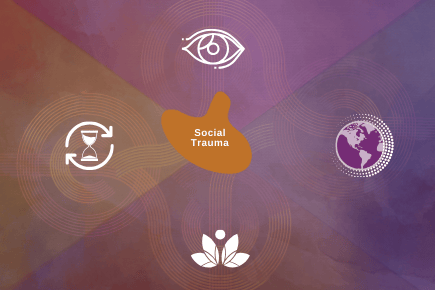
Social Trauma
The Societal Impact of Trauma
Social trauma is a relatively new term introduced by Andreas Hamburger and others. It encompasses collective experiences of trauma within societies impacted by dictatorship, war, forced migration, and other forms of violence. It integrates clinical psychology, psychiatry, and social theory to explore how these traumatic events affect individuals and communities. This interdisciplinary approach addresses conceptual frameworks, therapeutic interventions, and research methodologies to understand and heal societal traumas. Through scholarly dialogue and practical insights, social trauma studies aim to illuminate the complex dynamics of trauma’s impact on cultural memory, social cohesion, and ethical considerations in post-conflict and post-traumatic contexts.
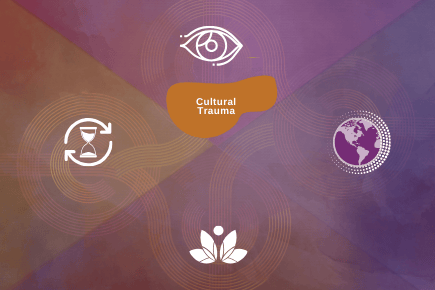
Cultural Trauma
Felt Sense within Cultural Identities
“Cultural trauma,” as conceptualized by Christopher Alexander, explores the collective resonance of historical wounds within cultural identities. Alexander’s work underscores how traumatic events of the distant past can imprint deeply on the cultural psyche, shaping shared narratives, values, and social structures. This notion extends beyond individual experiences to encompass the felt sense of trauma embedded within the collective consciousness of cultural groups. By examining the interplay between historical events and cultural identity formation, Alexander’s framework provides insight into the enduring impact of trauma on societal dynamics. It informs efforts to address historical injustices and foster collective healing.
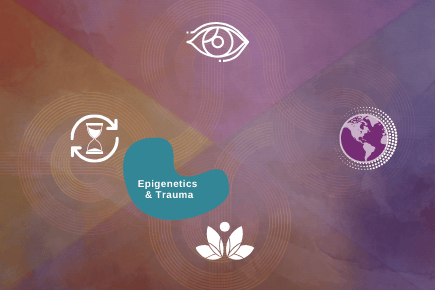
Epigenetics & Trauma
Genetic Transmission of Trauma
Epigenetics & Trauma, pioneered by Dr. Rachel Yehuda’s groundbreaking research, delves into the complex inheritance of trauma dynamics across generations through the lens of epigenetics. Yehuda’s studies have elucidated how traumatic experiences induce epigenetic changes, influencing gene expression and potentially affecting the psychological well-being of descendants. By exploring the intricate interplay between environmental stressors and genetic predispositions, Yehuda’s work not only reveals the biological mechanisms of transgenerational trauma transmission but also underscores the profound implications for understanding resilience and vulnerability in populations exposed to trauma. Her research highlights the need for nuanced interventions that address both psychological and biological aspects of trauma’s impact on individuals and communities.
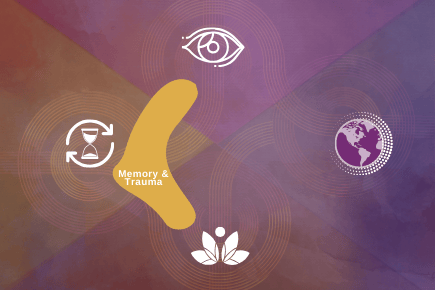
Memory & Trauma
Unprocessed Collective Events
Memory and collective trauma intertwine deeply in understanding how societies remember and process shared traumatic experiences as researched by Angela Kühner. Collective trauma shapes cultural narratives and identities, influencing how communities interpret their past and present. Memory studies illuminate how these narratives evolve, impacting social cohesion and collective healing. By examining the construction of collective memory through various lenses—psychological, sociological, and historical—researchers explore how memories of trauma can be preserved, distorted, or suppressed. Understanding these dynamics is crucial for addressing unresolved trauma and fostering societal reconciliation. The memory of collective trauma serves as a pivotal lens through which societies reckon with their history and envision a more resilient future.
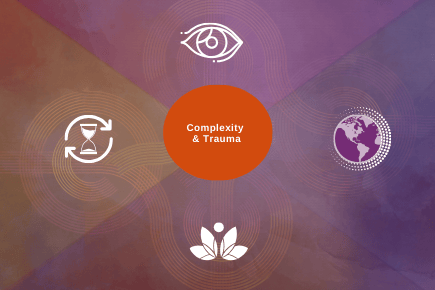
Complexity & Trauma
Trauma as Complex Adaptive System
Complexity and collective trauma intersect profoundly in the study of how communities grapple with and respond to shared experiences of profound adversity. Collective trauma disrupts social cohesion, cultural identity, and historical narratives, creating a complex web of interrelated challenges. Assemblage theory offers a lens to understand how diverse elements—psychological, spatial, social, cultural, and historical—come together to shape and perpetuate collective trauma dynamics. This perspective underscores the interconnectedness of individual experiences within larger societal frameworks, revealing how trauma manifests through fragmented narratives and interconnected social structures. Researchers navigate this complexity through insights from psychology, system science, cognitive science, anthropology, and history.
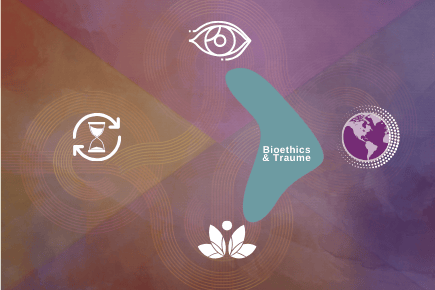
Bioethics
Ethics, Trauma and Well-being
Trauma intersects with bioethics through the complex ethical considerations surrounding the legacy of past injustices and their enduring impacts on health and well-being. Historical trauma, such as genocide, slavery, or colonial oppression, raises profound bioethical questions about responsibility, reparations, and reconciliation. These events have left lasting scars on affected populations, influencing health disparities, intergenerational trauma transmission, and cultural resilience. Bioethical frameworks provide critical insights into navigating these challenges and addressing issues of justice, autonomy, and dignity in the context of historical trauma. Understanding and addressing these bioethical dimensions is essential for promoting healing, equity, and ethical governance in societies reckoning with their traumatic pasts.
Thus, I define collective trauma via the multilevel crisis in representation inherent in trauma’s socialization and demonstrate how as trauma spreads, it interacts with existing political and economic factors.
Adam B. Lerner (Phd.), Associate Professor University of Massachusetts Lowell, Political Science
Trauma isolates individuals, yet it can also seep out, affecting those who surround and bear witness and, in doing so, shape political communities.
Emma Hutchison (Phd.), Associate Professor University Queensland, Political Science and International Studies
Collective memory of traumatic events is a dynamic social psychological process that is primarily dedicated to the construction of meaning.
Gilad Hirschberger (Phd.), Professor University Reichman, Psychology
While trauma research has become more comprehensive in the last decade, what is missing are references to a holistic process of trauma integration.
Thomas Hübl (Phd.), Academy of Inner Science, Pocket Project Co-Founder
Dissociation prevents the trauma from becoming integrated within the conglomerated, ever-shifting stories of autobiographical memory, in essence creating a dual-memory system.
Bassel van der Kolk (Phd.), psychiatrist, author, researcher and educator
There is a tendency of “[...] over- or under-emphasizing psychological processes“ when „[…] addressing ‘trauma for the collective identity.’
Angela Kühner, Professor Internationale Hochschule, Social Work
Cultural trauma occurs when members of a collectivity feel they have been subjected to a horrendous event that leaves indelible marks upon their group consciousness, marking their memories forever and changing their future identity in fundamental and irrevocable ways.
Jeffrey C. Alexander, Professor Yale University, Sociology
I call a time collapse a phenomenon that occurs when ideas, perceptions, feelings, as well as defenses connected with a chosen trauma collapse into ideas, perceptions, feeling and defenses connected with a current political or military conflict.
Vamık D. Volkan emeritus professor of psychiatry at the University of Virginia
Glossary
Interested in learning more?
The glossary that can be accessed below is designed to serve as a comprehensive guide to key concepts, terms, and theories related to collective trauma, trauma healing and collective trauma integration. Each entry in this glossary provides a clear definition of the term and references to key scientific publications. Our intention is to offer precise language and concepts to facilitates a deeper understanding and more effective communication within the field.
